

Samples for Academic Positions. Home » PhDs » Samples for Academic Positions Welcome to our collection of sample materials for faculty and postdoctoral positions.
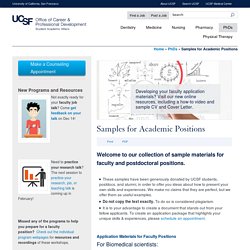
These samples have been generously donated by UCSF students, postdocs, and alumni, in order to offer you ideas about how to present your own skills and experiences. We make no claims that they are perfect, but we offer them as useful examples. Do not copy the text exactly. To do so is considered plagiarism. Career and Professional Development. (Hard copy: sender address and contact info at top.
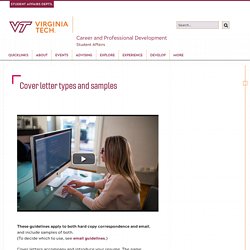
Your address and the date can be left-justified, or centered.) Your Street AddressCity, State Zip CodeTelephone NumberEmail Address Month Day, Year Mr. /Ms. Dear Mr. Opening paragraph: State why you are writing; how you learned of the organization or position, and basic information about yourself. 2nd paragraph: Tell why you are interested in the employer or type of work the employer does (Simply stating that you are interested does not tell why, and can sound like a form letter). 3rd paragraph: Indicate that you would like the opportunity to interview for a position or to talk with the employer to learn more about their opportunities or hiring plans. Sincerely, (Your handwritten signature [on hard copy]) Your name typed(In case of email, your full contact info appears below your printed name [instead of at the top, as for hard copy], and of course there is no handwritten signature) Enclosure(s) (refers to resume, etc.)
Cvtips.com: Sample Cover Letters. The Careers Service. Cover Letters. 100+ Free Cover Letter Samples Listed By Type, Format, and Job. Anatomy of a cover letter. What Are Employers Looking For? Skills and Qualifications - Careers Advice. With many graduates struggling to find work, it's wise to ask the question, ‘What are employers are looking for in a candidate?
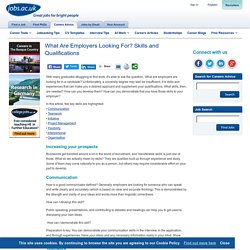
' 31 Tips On How to Write a Cover Letter. Ah, the dreaded cover letter.
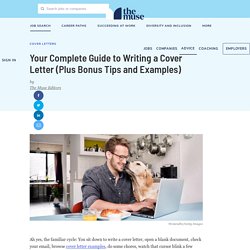
Every time you sit down to write one, you probably browse cover letter examples online, get overwhelmed, and think something to the effect of: Does anyone really read these? Wouldn’t it be so much easier if I could just let my resume speak for itself? First off: Yes, we can assure you that cover letters do, in fact, get read. In fact, to some hiring managers, they’re the most important part of your job application. And yes, while it would be easier to let your resume speak for itself, if that was the case you’d completely miss the opportunity to tell prospective employers who you are, showcase why they should hire you, and stand out above all the other candidates. Cover letter examples: changing careers. Making the big decision to change your career path can be daunting.
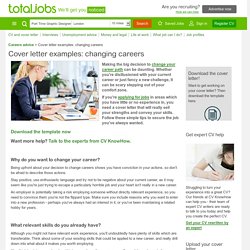
Whether you're disillusioned with your current career or just fancy a new challenge, it can be scary stepping out of your comfort zone. If you're applying for jobs in areas which you have little or no experience in, you need a cover letter that will really sell your strengths and convey your skills. Academic cover letters. It’s also important to understand what will and won’t be acceptable to the organisation you’re hoping to join.
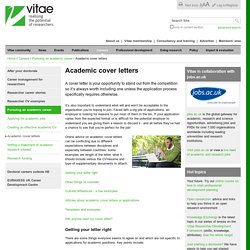
Faced with a big pile of applications, an employer is looking for reasons to put most of them in the bin. If your application varies from the expected format or is difficult for the potential employer to understand you are giving them a reason to discard it - and all before they’ve had a chance to see that you’re perfect for the job! Online advice on academic cover letters can be conflicting due to different expectations between disciplines and especially between countries: some examples are length of the letter, what it should include versus the CV/resume and type of supplementary documents to attach. Getting your letter right Other things to consider Cultural differences - a few examples.
Three excellent cover letter examples. The first thing a potential employer sees in your job application is the cover letter.
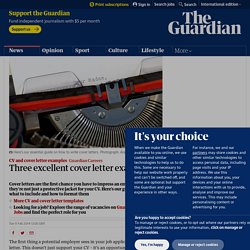
This doesn’t just support your CV – it’s an opportunity for you to stand out from the crowd and persuade the recruiter to put you through to the next round. Be wary of spending hours on perfecting your CV at the expense of your cover letter. If you need some inspiration on what to include and what format to use, here are our helpful guides – just remember not to copy them as exact templates. 1. Standard, conservative style This is ideal for sectors such as business, law, accountancy and retail.
The Complete Guide to Writing a Cover Letter. If you’re starting a job search in 2020, getting your cover letter right is just as important as perfecting your CV.
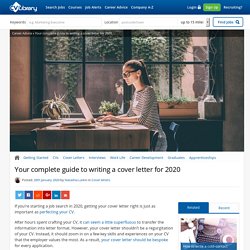
After hours spent crafting your CV, it can seem a little superfluous to transfer the information into letter format. However, your cover letter shouldn’t be a regurgitation of your CV. Instead, it should zoom in on a few key skills and experiences on your CV that the employer values the most. CV Cover Letters With Impact - Careers Advice. Your Cover Letter is your key marketing document.
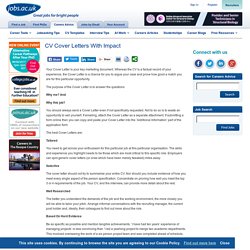
Whereas the CV is a factual record of your experience, the Cover Letter is a chance for you to argue your case and prove how good a match you are for this particular opportunity. The purpose of the Cover Letter is to answer the questions Why me? And Why this job? How to write a cover letter for research jobs. Prospects.ac.uk. Cover Letter Examples That Will Get You Noticed. Cover Letter Examples That Will Get You Noticed Posted by Pamela Skillings.
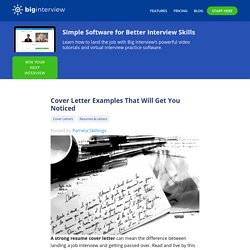
Marketing materials. Recruiters will use a variety of application methods; usually these involve some combination of CVs, cover letters and application forms. They all serve the same function - to get you an interview - but are used in different ways and possibly at different stages. As each job you apply for is different, you'll need to adapt these materials for each application. This might not mean a completely new version; more likely is that you'll have a CV for each category of job you're interested in and 'tweak' the appropriate one accordingly each time you submit an application. CVs The CV is the format you as researchers will be most used to; it is also an excellent starting point for application forms and the basis for covering letters. CVs and cover letters.